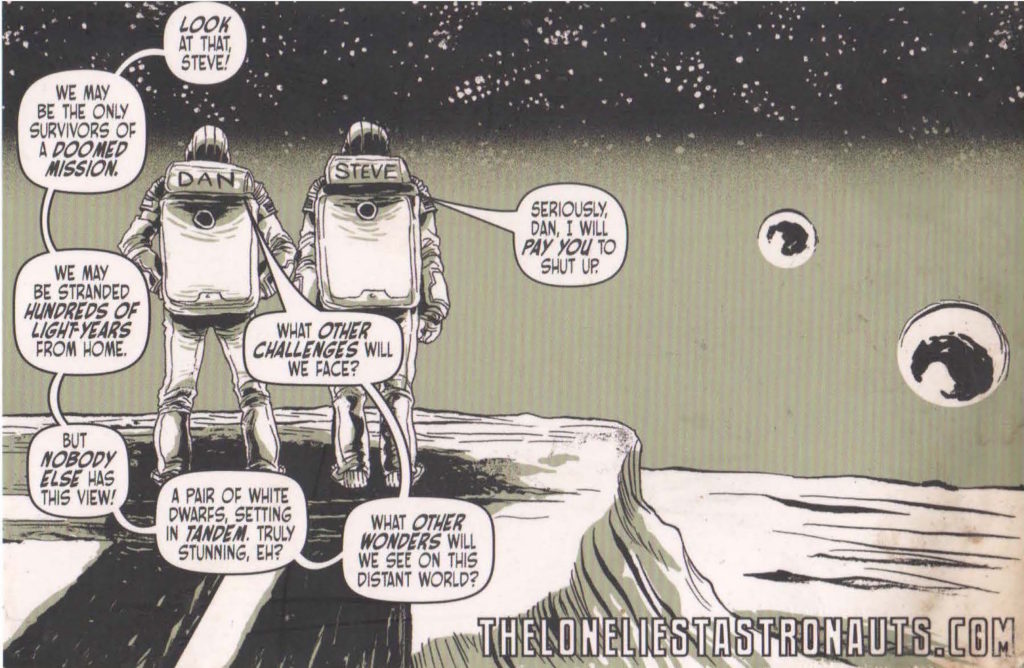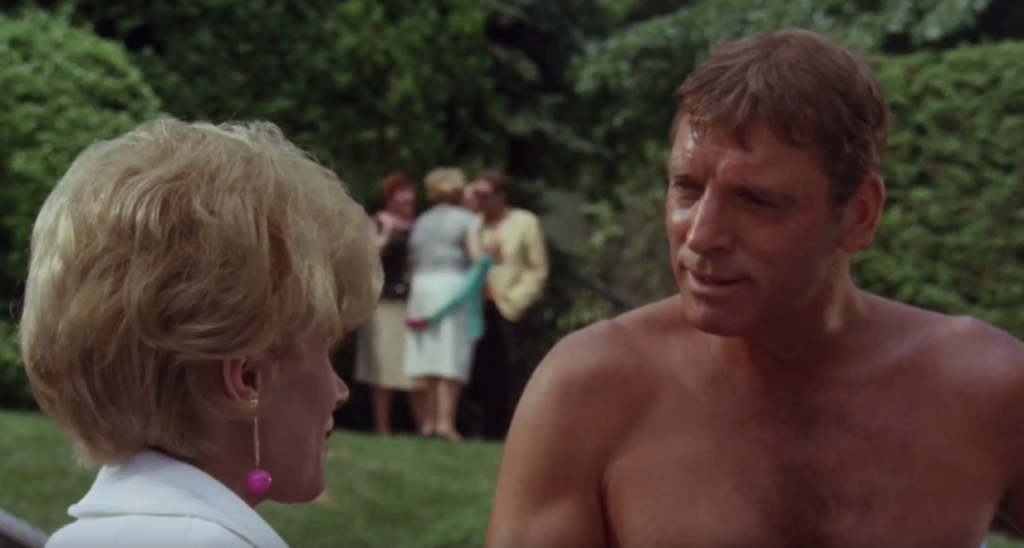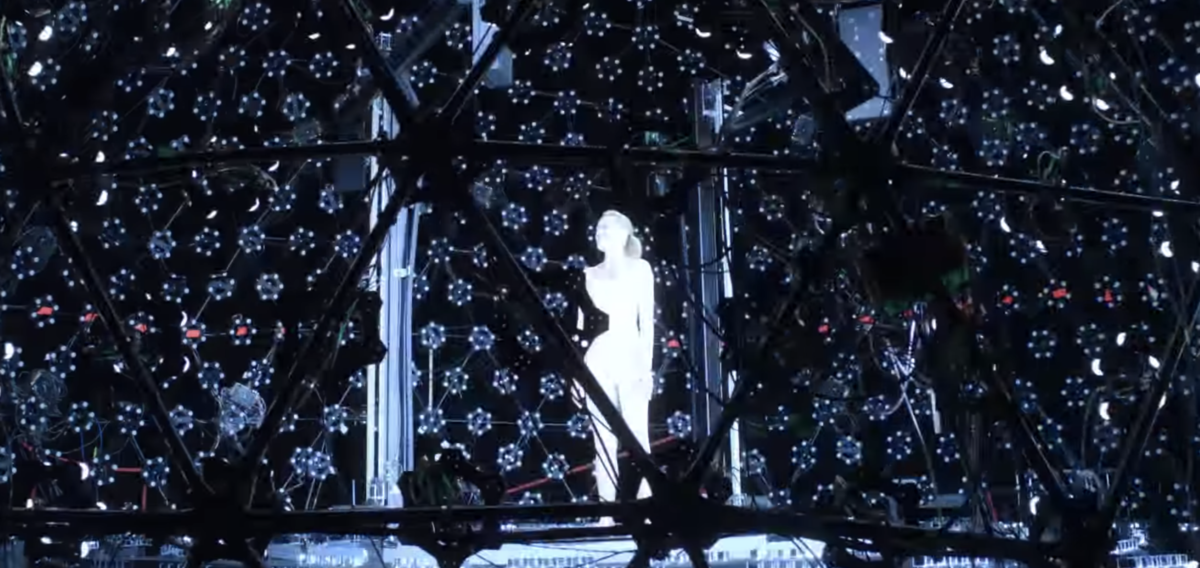One of our more ambitious members used “learning Audacity” as an excuse to avoid doing actual work and produced this audio version of her favorite Samuel Beckett short, Play.
Category: Classics
Blade Runner 2049
You should see this on the big screen. We will publish our review after it leaves theaters with the hope that you avoid other reviews before consuming it.
Moon
Some Spoilers Below
At just under ten years old, it is safe to say that Moon is a modern classic. One DMS member described it as “Multiplicity in space!” Brilliantly acted by Sam Rockwell, Moon is the low budget, well tempered answer to Event Horizon, which, if you’re in a situation like mine, you have to watch when your partner is out of town because it will cause nightmares.
We had not watched Moon since its 2009 release, and we are pleased to report that it rewards multiple viewings. The main (almost only) characters are Sam Rockwell, who plays a few iterations of the same cloned astronaut/moon miner (conveniently named Sam), and Kevin Spacey, who plays GERTY, a computerized assistant that is one part Kubrick’s HAL 9000, one part Claptrap, and one part GLaDOS. Watching as Sam’s plight unfolds, we could not help making comparisons to The Loneliest Astronauts by Kevin Church and Ming Doyle.

Moon is, however, something entirely different and effortlessly fresh. Plus, you get to see Sam Rockwell’s tight butt and listen to him make such dad jokes as “You’re really full of yourself aren’t you Doug,” while alone and talking to an extremely full plant he’s named Doug.
Without getting too deep into the plot, Sam is Jesus. He is nearing the end of his three-year contract with Lunar Industries under which he works as a miner of Helium-3 on the dark side of the moon. The number 3 appears repeatedly throughout the film, which we believe is a reference to the holy trinity (one of the first sci fi plots known to man). Each of the lunar rovers Sam watches over like a shepherd is named after one of the apostles. It is Matthew, who valued money above all else before meeting that guy Jesus in the New Testament, that ends up causing problems for Sam.
Sam’s little mining outpost provides the Helium-3 that allows the distant residents of Earth to enjoy unlimited green energy. Just as we in the United States benefit from and are therefore complicit in the wars our countries wages as evidenced by the goods we buy, the residents of Earth are all complicit in Sam’s plight. He pays the price for our reckless consumption and greed. Sam also kind of dies and kind of gets resurrected. Just like our boy J. Sam’s daughter’s name is also Eve.
At a pivotal point in the film, Sam Prime figures out what Sam the Original already knows but refuses to accept. Sam Prime refuses to let Sam the Original’s denial continue, but when Sam Prime is yelling “Wake up!” at Sam the Original, he might also be yelling at the audience. We should all be looking for clones hidden under the edifice we and our predecessors have painstakingly constructed. Walter Kovacs knew.

The last line of the film is a radio personality (probably hopped up on OCs) yelling through the froth in his mouth about Sam Prime’s return to Earth. You can likely guess what he called him, but in light of the current scumbag’s two Executive Orders on the subject, we want to highlight that Sam Prime is referred to as an “illegal alien” in the final words of the film. If you have not read the scumbag’s lesser discussed Executive Order, linked above, you should. Section 8 purports to “empower State and local law enforcement agencies across the country to perform the functions of an immigration officer in the interior of the United States to the maximum extent permitted by law.” That is a terrifying and potentially irreversible erosion of our Fourth Amendment rights to be free from unreasonable searches and seizures.
The attention to detail throughout the film is subtle and refreshing. For example, the attorney we keep on retainer specializes in trademark law and tells us that the logo for Lunar Industries is a phenomenal trademark.

It is a Sunday afternoon. If you have not seen this movie, watch it right quick. If you have seen it, let it unfold in front of you again. You will not be disappointed.
Watchmen
After lying in furtive restlessness for hours the other night, this DMS member slid from underneath the covers, shuffled to the living room, and decided to re-watch the film adaptation of Watchmen. So now we know who watches them. Please tell Alan Moore. Maybe also check out Moore’s latest hit, Providence.
The DMS’s in-house doctor believes our rapidly increasing bouts with insomnia are a direct result of exposure to information about current events. Also past events. See Thompson, Hunter S., Better Than Sex: Confessions of a Political Junkie (1995); Thompson, Hunter S., Fear and Loathing on the Campaign Trail ’72 (1973). Unfortunately, our esteemed doctor studied history before medical school, so she is not optimistic that a cure will be developed anytime soon.
As the media, correctly, churn out articles discussing one of two chilling Executive Orders signed by a scumbag on January 25, 2017, in-depth reviews of the same scumbag’s restructuring of the National Security Council appeared below the fold. Maybe it is the cognitive dissonance inherent in feeling nostalgia for the Bush administrations, but during this viewing of Watchmen, we got a bit closer to understanding Sally Jupiter’s refusal to hold a grudge against Edward Blake, the Comedian. We do not condone the Comedian’s many horrific acts of violence, but evidence is piling up that this life is a terrible joke.
We think the Comedian solidifies his opinion that, as Walter Kovacs repeatedly tells viewers, the end is nigh when Dr. Manhattan watches passively as the Comedian guns down a woman carrying his child in Vietnam.

Since we have copies of the comic books handy, we will quote the Comedian from his original rant directed toward Dr. Manhattan.
“You watched me. You coulda changed the gun into steam or the bullets into mercury or the bottle into snowflakes! You coulda teleported either of us to goddamn Australia[,] but you didn’t lift a finger!” (emphasis in original). Dr. Manhattan, a character with god-like abilities, does not care about humans in the Comedian’s view, and, well, the Comedian saw how terrible humans can be to each other.
In the film, Nixon has ruled with an iron fist for more than a half dozen terms. Democracy is a farce, and the audience is left with a question: Is Adrian the hero, or is it Kovacs? We are reminded of a passage HST wrote while covering the ’92 election:
“Some people will say that words like scum and rotten are wrong for Objective Journalism—which is true, but they miss the point. It was the built-in blind spots of the Objective rules and dogma that allowed Nixon to slither into the White House in the first place.”
After Nixon died, HST wrote “Richard Nixon was a warrior: He gave no mercy and expected none.
Yet he approved my first White House press pass and never had me busted for the horrible things I wrote about him.”
What would HST write about our current scumbag? He might have written a joke but not the laugh out loud kind.

Stranger Things
While there must be close to 1,000 micrograms of nostalgia in each episode of Stranger Things, do not watch it because it triggers all those fuzzies from your childhood. Watch it because it is a fantastic show that ups the bar for content in a world where Two and a Half Men was consistently one of the most watched shows in the United States for more than a decade. Watch it because, much like Olympic Games, it plants ideas. Stranger Things happens to plant positive ideas about gender identity, people with different colored skin, and generally how humans should treat other humans. Unlike Olympic Games, Stranger Things mostly delivers its payload without detection.
With that disclaimer, we will indulge in a bit of nostalgia. If the only thing we know about something is that it is a bit twisted, we sometimes like to consume it in a non-linear fashion. The first episode we watched was the fifth, which we were told was the penultimate episode. Still thinking we had watched the second to last hour, we watched the first episode before watching the surprisingly long (to us) conclusion. Then we went back to the beginning and watched the initial installments sequentially. Consuming media is not something we do for fun, we do it to probe our physical, emotional, and intellectual limitations. In this case, it was like eating dessert first when your parents were not paying attention.
Set in 1983, the real evil confronted in the series is a human with an all-too-real backstory. The period-correct brands and references up the score on the realness scale even as Akira-level madness starts to mix with a narrative that will remind you of Flight of the Navigator, ET, The Dark Crystal, and several other experiences from your childhood. Our non-linear viewing method led us to believe the narrative would end up in an extremely dark place. The parallels with Grant Morrison’s recent 6-issue comic book series, Nameless, and the story scattered across Reddit one chapter at a time by a user named 9MOTHER9HORSES9EYES9 are a bit on the nose. It does not get that dark.
The end, in fact, is in many ways extremely uplifting. One of us found ourselves sobbing because of one character’s flashbacks and his own memories of a younger sibling who was not expected to live. There are a lot of positive messages packed into this narrative. One of the reasons we focus on dystopian films is that by learning more about the way our world works, we hope to avoid the versions of the future (or past) that we see reflected in such films. Is it naive to think that the more we learn about how terrible humans are to each other, the better the world becomes?
Fandango
Watching a herd of people on my roof watch fireworks through their cell phones immediately reminded me of this scene in Fandango. Though not technically dystopian, we might do well to remember that some of our parents may not enjoy a celebration involving loud, colorful explosions. This film follows a group of kids taking a road trip across the country before shipping off to Vietnam. (NOTE: A recent viewing of this film reminded us that it has some deeply problematic scenes.)
I would have been drafted had I been born on the same day but the year of my father’s birth. He watched the draft with several neighborhood kids huddled around a boxy television. During my lifetime, I have only seen groups of draft-age children stare at a television with that intensity when sports and binge drinking were involved.
The next time you are tempted to yell at a distant athlete through a one-way flatscreen, pretend your friend’s life is in the balance. Then remember how lucky we are that we can pretend. Also, maybe call your parents if you can and tell them that you love them.
Curious what your draft number would have been?
Ghost in the Shell
With the upcoming live action Ghost in the Shell three dimensional experience approaching, it feels like a good time to revisit the ghost hacked garbage truck driver who asked “[w]hat does a virtual experience mean then?” Probably not a three dimensional movie, but those kids at Dreamworks and all the punks who have the skills but moved to New York to cut their teeth on freelance benders are making it pretty damn difficult to tell if the pixels I see on the way to work are forming Time Square in my reality or yours.
“I am a life-form that was born in a sea of information.”
Speaking of Times Square, school is out, and teenagers instinctively know that Times Square is their territory. I am more afraid of a group of teenage boys than anything else I encounter on a regular basis. When they suss out that deep dark insecurity you didn’t know still lingered, they let their insults fly casually so you know how easy it is for them to hurt you.
These kids. They were born in a sea of information. They don’t, as far as I can tell, have George Church’s sili brains, but they do carry a rough draft around with them like the rest of us. Will they give us a choice when they merge?
Released at the end of 1995, which began with the opening statements of the OJ Simpson trial, Ghost in the Shell was both ahead of its time and right at home in the same year that witnessed the Oklahoma City bombing and the Unabomber when some of us were naive enough to believe that tragedies on US soil were by definition outliers.
The film did not depend on special effects or violence to the same extent The Matrix franchise would a few years later, instead, it asked a serious question about the future of humankind. These Times Square kids might be surprised at how much dialogue is in this film. It is thoughtfully constructed, and its spirit is more in line with Olaf Stapledon’s Star Maker than most stories involving cyborg assassins with ghost cloaks.
Ghost in the Shell was visually inspired by Blade Runner, and that is beautifully evident in the final scene, which takes place in a large room with a domed ceiling that intentionally or not looks like a sly nod to the impossibly fresh view of LA’s iconic Bradbury Building seen in Ridley Scott’s masterful adaptation of PKD.
If you’re feeling broken, take an evening to re-watch this classic before the marketing blitz for the live action remake assaults you. Watch the subtitled version and, if you can, try to get a teenager into it.
V for Vendetta
The first issues of the comic, V for Vendetta, penned by Alan Moore were published the same year I was born. Years later, the collected edition was my first meaningful foray into comic books when my 19th century British literature professor inexplicably put it on his reading list. I don’t think he got tenure. He did, however, recommend picking up Watchmen. Solid advice from anyone.
The film, while entertaining, sanitized one of the main characters, V, and Moore saw another of his anarchic screeds turned into a family-friendly product. One glaring omission in the film is the absence of V’s laboratory where he makes “hallucinogenics as cheaply as water.” In Moore’s book, LSD is almost a character in a pivotal scene. Of course, the film gave Moore an opportunity to engage in what seems like his favorite pass-time: misanthropic grumbling. Overall, the movie is a fun adaptation, but this time I find myself agreeing with most of Moore’s complaints.
Planet of the Apes
April 21, 2016
Released the same year Stanislaw Lem published His Master’s Voice, Planet of the Apes is a classic. While Lem examines the limits of human intelligence as his characters attempt to decipher an extraterrestrial transmission that may contain instructions for a weapon (much like the 2016 film Arrival), this film explores similar territory by stranding an intrepid astronaut, Charlton Heston, on an unfamiliar planet.


Heston is no Burt Lancaster, but he delivers an immortal line at the end of the film as he metaphorically and literally pounds sand. You may be familiar with the twist at the end of the movie, but few people realize that this scene is the origin of the idiomatic phrase “go pound sand.”
The film also inspired this earworm from The Simpsons:
The Congress
This film is worth a watch even if you haven’t read Lem’s classic, The Futurological Congress. Robin Wright plays herself, and Harvey Keitel delivers a fantastic monologue.
